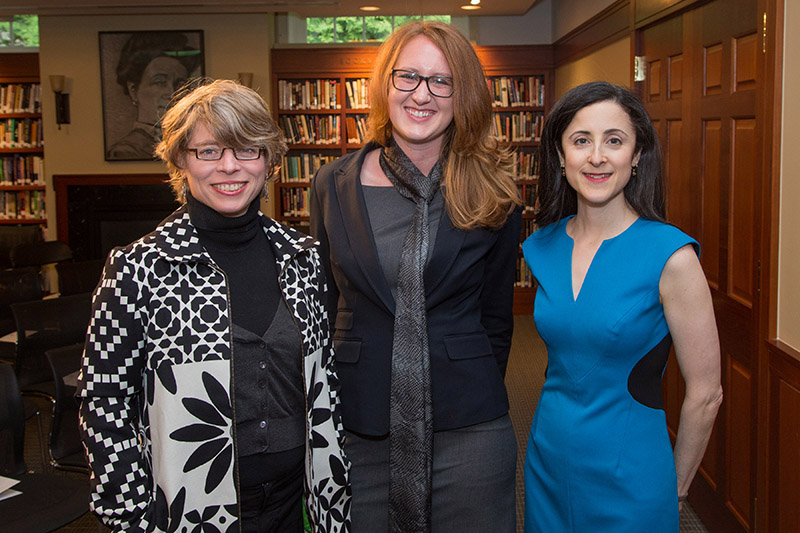
Jill Lepore, Adrienne Berard, and Sheri Fink, winners of the J. Anthony Lukas Prize Project awards
On May 13, the J. Anthony Lukas Prize Project awards were presented to Pulitzer Prize-winning author Sheri Fink, Harvard history professor Jill Lepore, and Adrienne Berard, a 2013 graduate of the Columbia Journalism School. The three women’s works were selected as exemplary nonfiction, noted for their literary artfulness and social relevance.
Fink won the $10,000 J. Anthony Lukas Book Prize for “Five Days at Memorial: Life and Death in a Storm-Ravaged Hospital.” Her book explores the decisions made in a New Orleans hospital, with Hurricane Katrina’s floodwaters rising, power failing, and more patients than could be easily evacuated. “My hope was the idea that if we walk through these worst-case scenarios before we ever have to face them ourselves, that we can take something from that,” said Fink. A question central to her work, she said, is whether a moment of crisis is an exceptional moment, when people can make exceptions to moral rules “or is a time of crisis, a time when we should hold on even more tightly to our deepest moral values.”
Jill Lepore was the $10,000 Mark Lynton History Prize winner for “Book of Ages: The Life and Opinions of Jane Franklin.” Franklin raised her children and grandchildren in poverty, but thanks to her brother, Benjamin, she had the rare chance for a woman of her day to learn to read and write. Lepore wanted to counter the common inability in feminist thought to reconcile the life of the mind with the life of the mother, by presenting Jane Franklin as the intellectual she was, writing letters to her brother and reading everything he wrote and much more. “That was a real source of pleasure for me to find that redemption in a life of great sorrow, to find that sense of joy and pleasure that she gained as a reader in reading good writing.”
Lepore discussed the difficulty of crafting her narrative around the female Franklin, whose life was so less monumental than her brother’s. Lepore compared Ben and Jane to the prince and the pauper: “You want suddenly there to be this dramatic reversal, as a reader you desperately crave that change, and it never comes.”
The $30,000 J. Anthony Lukas Work-in-Progress Award went to Adrienne Berard for “When Yellow Was Black: The untold story of the first fight for desegregation in Southern schools.” Berard’s book, to be published by Beacon Press, tells the little-known story of a U.S. Supreme Court case involving Martha Lum, a 9-year-old Chinese girl from the Mississippi Delta who was barred from attending the local all-white school. The lawsuit was filed with the help of her father and the state’s governor at the time (“an Atticus Finch of a man,” says Berard). They lost in 1927, and questions of race and segregation were left up to states for the next 27 years. The case was cited over and over when segregation was finally ruled unconstitutional in Brown v. Board of Education. “It is the building blocks for what becomes the civil rights movement,” Berard said.
She found the subject of her story by chance, while looking into her own family history in the Delta, her birthplace and home to her family for three generations. “It’s a homecoming of sorts, not that I’m Chinese American, but that I’m Southern,” she said. She compared her familiarity with the setting to knowing a second language that brings her closer to the subjects of her research, while leaving room for the critical distance needed for effective storytelling.
The awarding of the prizes was followed by a discussion before a packed audience at Lippmann House with the winners, moderated by Steve Coll, dean of the Columbia Journalism School. The school and the Nieman Foundation co-administer the awards.
Longtime magazine editor Lee Aitken, who was in the audience, asked the prizewinners for their thoughts on the progress that’s been made by women in journalism and the problem of their continued underrepresentation in journalism outside of the “ghetto” of traditionally female topics. Lepore affirmed the continued reality of the “women’s ghetto.” She had wanted to write about Jane Franklin at the very beginning of her career. “I completely turned my back on it,” she said, “because the cost, as a young scholar, of starting off writing women’s history—it’s a very high price to pay. I think it really shapes a lot of women’s careers.”
Beacon Press director Helene Atwan asked Fink about the difficulty of questioning people about their harrowing experiences in the hospital. Fink said that for doctors and nurses who had had some agency, the experience had seemed in a way to be the best moment of their lives as well as the worst. “There’s some sense of purpose that people have in that acute crisis,” she said. “People get depressed in the time after.” She also said the therapeutic value of discussing or debriefing trauma has been refuted: “We as journalists don’t get to feel as good about, ‘Oh, I’m letting them talk so I’m doing something good for them.’ We have to realize we’re doing it for ourselves, or hopefully for the larger good of getting the truth out into the world.”

